'It will happen!' Why HOF'er LeRoy Butler sees greatness in Evan Williams
Go Long flies to Wisconsin to sit down with a Packers legend and an ascending star at safety. Butler's words of wisdom will stay on the rookie's mind for years, too.
GREEN BAY, Wisc. — Kinship is instant. The moment LeRoy Butler and Evan Williams meet, it’s as if the Green Bay Packers’ rookie safety and the Pro Football Hall of Famer have known each other forever. There’s exactly zero awkwardness between two men from two totally different worlds. They embrace. Butler hands him a signed jersey and — exactly three minutes and two seconds into conversation — starts referring to Williams as Nephew. They’re not related, but through two hours of completing each other’s sentences, playful jabs and timeless wisdom, the 23-year-old from Campbell, Calif., and 56-year-old from Jacksonville, Fla., seem like blood by the end of the night.
Williams has a longtime girlfriend waiting back at his place.
Butler is staring down the barrel of a 120-mile drive back to Milwaukee.
Neither wants this first football date to end. Both are so entranced in each other’s life stories that they could easily chat for another two hours and shut the restaurant down. When he’s most hopeful about the kid’s future — when he stares into his virtual crystal ball — Butler says something that catches Williams by surprise. He tells him he needs to write a book.
Huh?
The rookie is confused. Hands in his hoodie pocket, face scrunched, Williams politely informs his new mentor that his career has barely started.
“You have a legacy now,” Butler says. “You made it.”
Williams can’t play along. “It is halfway through Year,” he chides, “and you’re telling me, ‘You made it?’”
That’s when Butler shares his most valuable lesson of the night. His point is that Evan must speak greatness into existence. Prioritize “legacy” — dare to push Super Bowls and All-Pros and Canton to the forefront of your mind — and all the above become an inevitability. If you don’t think this stuff will happen, well, it won’t happen. Period. As those words sink in, Williams nods. It hits him that his father has been saying the exact same thing for years.
He repeats Dad’s words here. “If you think it won’t happen, then it won't. But if you say it will…”
Butler interrupts with an emphatic, “It will happen!”
To illustrate, he swiftly fills Williams in on a life that’s currently being made into a documentary. A life he still doesn’t believe himself. Butler was so pigeon-toed when he was born that doctors needed to break bones in both of his feet. He spent years of childhood in leg braces and a wheelchair. He grew up in Jacksonville’s crime-infested “Blodgett Homes,” where nobody ever went pro. He wore hand-me-down clothes every day. He took special-needs classes. He was relentlessly bullied. His late mother — a teacher, his hero — raised five kids alone.
Yet at eight years old, Butler made a preposterous statement.
He informed his mother, Eunice, that one day he’d make it to NFL and lift her out of poverty.
Mom didn’t flinch. Mom told Butler to be a “leader,” not a “follower.” When her friends asked why her kid could never stop smiling, she told them that LeRoy knew exactly where his life was headed: the NFL. They laughed. And despite an infinite number of trappings all around him, Butler never smoked, never drank. That kid in leg braces went on to invent the Lambeau Leap, go All-Pro four times, win a Super Bowl, make the 1990s All-Decade Team with 20.5 career sacks and 38 interceptions and, of course, finally earn a gold jacket.
“There was a killing every day,” Butler tells Williams. “Shootings. Drugs. Prostitution. Everything. And the reason why I made it is I knew I was going to make it.
“You’ve got to embrace making it and don’t be embarrassed by it. Because of your legacy.”
The frizzy-haired, baby-faced Williams absorbs every word as gospel. Don’t let his gentile disposition fool you, either. Green Bay’s 111th overall pick in the 2024 NFL Draft has become an indispensable, disruptive thunderbolt vs. the run with a LeRoy-like sixth sense to arrive in the right place at the right time vs. the pass. This is a completely different defense with Williams on the field, which is why the rookie played a season-high 71 of 72 snaps in last week’s win over Chicago. The Packers are not 7-3 without him.
Very soon into this season, Butler noticed. The team’s iconic No. 36 would zero in on No. 33 and see himself. The instincts. The playmaking. It was spooky.
So, we had an idea at Go Long: Let’s bring the two together. Let’s see what happens when two safeties from two very different eras talk ball over dinner.
Here at The Lodge, Butler orders a Sprite with five sliced lemons. “I have a friend that loves lemons,” Williams says. “I make fun of him all the time.” There’s no Caesar left, so Butler audibles to raspberry dressing for his salad. Williams orders a crispy chicken sandwich and helps me polish off a bowl of cheese curds. Point out that Williams was born the July of Butler’s final NFL season, and Butler says he’s got a coincidence better than that. Evan shares the same birthday, July 28, as his beloved mother.
What happens over the course of the next two hours is a truly awesome sight. Williams details his psyche. Butler, this organization’s greatest ambassador, shares endless threads of wisdom. A mentorship is born.
The two raided offenses at Lambeau Field three decades apart.
Butler used to ask coaches for “VHS” copies of his games to study, and those three letters make Williams laugh. He’s heard about those things. He pretends to draw one in the air with his finger. Williams relives his “portal” experience in college, and he might as well be talking about a portal into a new dimension.
The more we chat, however, the more it’s obvious that as much as we think football drastically changes era to era, a player’s true legacy does not.
Green Bay may have LeRoy 2.0 on its roster, too.
Go Long is your home for longform journalism in pro football.
Subscribers can access all stories and all podcasts:
The great unknown
On the other side of the country — in his city of 40,000, seven miles southwest of San Jose — Evan Williams did not grow up to the sight of hookers, the sound of gunfire and the scent of drug deals. He didn’t wear shabby, stained t-shirts. His legs weren’t in braces. Both of his parents were present. His father, Garey, actually played college ball at the University of California and was a proud member of “The Play” vs. Stanford in 1982. His brother, who’s 2 ½ years older, played at Oregon and is currently a DB for the CFL’s Ottawa Redblacks.
Initially, I fear zero common ground. It does not appear these two grew up remotely the same.
Until Butler says that he was a shy kid.
Williams eagerly jumps in.
His brother was an extrovert out of the womb. Early as 3 years old, at the park, Bennett enjoyed inviting complete strangers over to their house for dinner. But Evan? He describes himself as the polar opposite. Any time he didn’t want to talk to someone, he’d close his eyes and pretend you weren’t even present. “I did the same thing!” LeRoy says. “I used to close my eyes and put my hands over my eyes like this.” When all the kids headed downstairs to play at church, LeRoy says he was the butt of jokes. His grandad taught him how to laugh along with the jokes, so those kids know nothing ever bothered him. The jokes stopped. He could keep to himself again. That’s exactly how Williams liked it, too.
Hard to fathom given their equally vibrant personalities tonight.
Football extracted the vibrant personalities out of both. Williams vividly recalls tapping into an “unmatched passion” for the sport. Through Pop Warner, he played quarterback as the best athlete on the team. The plays were essentially “Evan Right,” “Evan Left” and, sure, Evan loved hearing the crowd roar as he broke free. But he hated being touched. At age 11 and 12, that changed. He fell in love with the sport’s physicality.
“You start to understand how football is a game of contact — making it and escaping from it and causing it,” Williams says. “Around that time, I got more physical and the game opened up for me.”
His father taught him the intricate concepts behind a play. Williams realized there’s a “science” and a “why” and he’d often ask to play fullback for two reasons. One, the position guaranteed contact. Two, he could help a friend score a touchdown. Soon enough, he was starring in Division I football. First, at Fresno State for four years. Then, one final 2023 season at Oregon. Butler asks all about his experience in that portal, a foreign concept to a 1989 Florida State All-American.
This launches Williams into a funny story about Lincoln Riley. After he informed the USC coach that he already had a visit to Oregon planned that weekend, Riley told him not to worry about it. They’d get him to their campus in the middle of the week and then purchase his flight to Oregon. “We just want you to come here first,” Williams says Riley told him. Others might’ve enjoyed such fawning, but not Williams. It turned him off. He visited Oregon, chose Oregon and solidified himself as an NFL prospect. On the field, he had a team-high 82 tackles with 4.5 sacks and a forced fumble. In the classroom, there were only 20 to 40 kids in his business classes. The only downer? Despite five years of college, he never got his degree. About 30 to 40 percent of his credits didn’t transfer to Oregon. Finishing online isn’t an option because one class requires mandatory attendance.
The girlfriend he met in English class of his freshman year at Fresno wasn’t too thrilled about Evan moving so far away, either. “Oh boy!” says Butler, dramatically readjusting in his chair. But the two stayed together. Communicated. And when Butler hears they’re still together, he starts applauding. He loves it. He brings her up throughout the night to emphasize the value of family. That support is crucial because he’s seen the sport’s stressors eat players alive. You need your house in order, he explains. You need loved ones to lean on.
That’s why Butler is starts all NFL talk with the Combine — his first stressor.
Their experiences in Indianapolis were equally demoralizing.
After generous listings throughout college, the week got off to a rough start with Williams’ official measurement of 5 feet, 11 5/8 inches tall. (“That hurts my feelings still.”) Soon enough, it was time for the most important moment of his football life: a 40-yard dash. This TV spectacle of an event makes it seem as if nothing you did all fall even matters. He wasn’t computing X’s and O’s in his head on third and 8, licking his chops, to the backdrop of 70,000 screaming fans, with the game on the line. It was… quiet. The deafening “silence” inside Lucas Oil Stadium was unsettling.
“You could hear everybody’s workout,” Williams says. “You could hear everybody’s footsteps. I’m like, ‘Wow.’ You get up to that 40-yard dash line, you shake it out, you hear: ‘Evan Williams!’ It’s quiet — as quiet as anything you’ve ever heard!”
He had devoted the previous two months preparing for this one sprint. Williams stepped up to the starter’s line, his mind shut off and adrenaline took over. “No prominent thought is in your head,” he says. Only: Get to this finish line as fast as I can. Stopwatches were punched as he crossed the finish line and all that was missing inside of this stadium was the bellow of a sad trombone. Williams clocked in at 4.60 on both of his runs, tied for 14th amongst safeties. Only two players were slower.
Which wouldn’t have been a big deal if he knew teams liked him. He had zero clue. From January to April, he felt more and more like a kid thinking Santa Claus was going to skip his house this year. In Mobile, at the Senior Bowl, he saw other prospects called in for private interviews. Exactly zero teams requested to see him. (“Damn, am I missing something?” he told himself. “Am I messing up?’”) At the Combine, peers were again called up in droves. One of his friends loved BS’ing with Chargers coach Jim Harbaugh. No teams even asked to visit with him inside a suite. After leaving Indy, he had zero in-person, top-30 visits. (“What the hell?”) A few teams requested Zoom chats, and that’s all. What began as FOMO was now a true fear of draft-day disappointment.
People started telling him that going undrafted wasn’t all that bad. He could pick his destination. Honestly, they should’ve just pissed in his glass of water. (“I don’t want to hear that shit!” he says.) His brother predicted fourth round. His girlfriend predicted third. (Another reason why LeRoy believes she’s a keeper.) But a small part of Evan truly feared 257 picks would pass without hearing his name.
Was it all because of that 40? Coupled with being below 6 foot? Doubt crept in.
Ahead of this dinner, Williams punched Butler’s name into Google and YouTube. He read somewhere that Butler ran a 4.56 at the Combine as a cornerback and — when Butler says he had the “worst hands” — Williams isn’t surprised. He brings up a video of Butler telling Peanut Tillman he wished he had his hands. Butler assures the rookie that his Combine experience was far worse than he could imagine.
On Day 1, Butler walked toward the field in his own clothes. Someone had given him a bag upon arrival, but he thought it was free swag. A Combine official instructed him to head back to his room to change. Butler returned, and Butler assumed teams would see his production in ’89 — seven interceptions for 139 return yards with a TD — on the heels of Deion Sanders doing the same thing at the same school and view this proceeding as a formality.
“I’m thinking I’m hot shit,” Butler says.
Instead, it was a disaster.
Over the loud speaker, his official height and weight were announced: 5-11 ¾, 182. He couldn’t believe it. “I said, ‘Bullshit!’” snipes Butler. (Williams howls.) Butler can still picture the look of dismay on Bill Parcells’ face. On to the drills, Butler had no clue how to run the shuttle and asked guys in line for advice. Despite all of those college picks, he was not confident catching the ball. He hopes his Wonderlic score is buried forever. Worst of all, of course, was his 40. On his first attempt, Butler proudly proclaims he ran “a blistering 4.66.” The first thought that crossed his mind upon seeing that time was his agent insisting he needed to clock in the 4.4s. “I’m hitting 4.4 if I get in a car,” Butler says, “and giving it all I got!” (Williams peels over in laughter.)
Meanwhile, another cornerback in his group — Fresno State’s James Williams — ran the 40 in 4.34 seconds, a time that’d get him drafted 16th overall by the Buffalo Bills.
The name rings a bell.
“That was my DB coach,” says Evan. “That’s hilarious.”
“He was sprinter fast!” Butler adds.
Evan heard grumblings that his assistant coach at Fresno State could fly. He saw the runner’s calves. He knew James Williams lasted four years with those Bills in the early 90s.
“Just not as prolific as somebody that ran 4.66,” the rookie says, nodding to Butler.
Butler had to wait until the 48th overall selection to get a phone call. When the Packers’ late-great PR man Lee Remmel handed the phone over to head coach Lindy Infante, Butler barked at his new boss: “The hell took y’all so long! I should’ve been the first round.” His voice must’ve been on speaker phone because he could hear laughter on the other end, including the man who believed in him. Dick Jauron, the DBs coach, knew Butler’s smarts were more valuable than any Combine drill.
Thirty-four years later, Williams needed to wait much longer at his Lake Tahoe draft party.
As 21 other defensive backs flew off the board, his skepticism worsened to pessimism. Going undrafted felt like a real possibility.
On the morning of Day 3, he received an encouraging text from someone with the San Francisco 49ers. The defending NFC Champs told him something to the effect of, “Great day, be ready, excited for you man.” He grew up six miles from Levi’s Stadium in Santa Clara. He was a huge 49er fan and knew the hometown team owned the 124th overall pick in this fourth round, acquired via the Trey Lance deal. He allowed himself to dream — briefly — and that’s precisely when Brian Gutekunst climbed up the board to get him. Picking No. 129 overall, the Packers GM jumped up to No. 111 to select Williams. As he spoke to Gutekunst and head coach Matt LaFleur, Williams nodded toward Bennett, who immediately started punching the air.
Williams told the Packers they wouldn’t regret this choice and, at that moment, euphoria erased self-doubt. Nothing else mattered.
Not the Combine. Not his 40. Not where he was drafted. Not any comment from any skeptic.
“I don’t need anybody to tell me what I am and what I’m not,” Williams says.
His play soon epitomized this conviction.
And LeRoy Butler noticed.
Seeing the light
The summer before his first training camp, on a Saturday night, Butler headed to “Lotharios” — a club in town. But as he drove down Lombardi Avenue, Butler was gobsmacked by a perplexing sight. There were still lights on at Packers HQ. It didn’t make any sense to him. Who in God’s name was working this late? Shouldn’t they be at home with their families? A teammate told Butler those were coaches, and he was floored.
That point forward — as he explains to Williams — Butler knew he needed to listen to everything coaches told him.
He viewed his profession as more of a day-to-day quest to learn as much as he possibly could. Very quickly, he realized such an open mind was rare. “I’ve been around players — All Pro players — who dismiss the coach and they wonder why it cost us a game,” Butler says. The Packers shifted Butler to safety where his instincts revolutionized the position. Instincts that were the result of something quaint: a curiosity. Anyone who’s gotten to know Butler personally over the years can attest to this character trait. If he calls, there’s a good chance you’ll be on the phone for the next 40 minutes. As he visits the bank, gets his car washed, drives all over Wisconsin for various charitable endeavors, Butler asks about your wife, your kids, your business. I’ve never met a former NFL player of his stature so genuinely inquisitive.
Not surprisingly, through the 90s, Butler viewed his time at the facility as a free education.
He rapid-fires three separate breakthrough moments.
When Brett Favre rose to prominence, Butler sat in on his meetings. One play was his personal “kryptonite:” Fox 2 XY Hook. When tight end Mark Chmura hits the brakes, Favre told Butler, he reads Butler’s body. He sees the safety take a step upfield to cover Chmura, leaving Antonio Freeman deep behind him. On film, Favre pinpointed this glitch in Butler’s game. A linebacker would bite on Favre’s play-action fake to the running back — vacating the tight end — and Butler’s impulse was to jump the tight end, to clean up someone else’s mistake.
Tight ends presented a challenge so he met with the team’s tight ends coach, Andy Reid. True, Butler’s coverage skills granted the Packers all sorts of flexibility. On third down, they could stay in base because Butler was able to cover the slot. Green Bay had no problem sticking Butler on nimble receivers and bulky tight ends alike. This also happened to be the era of Ben Coates and Shannon Sharpe. “They got muscles I ain’t never seen,” Butler tells Williams. “I ain’t got no six-pack. I just got a one pack and a bunch of fat.” Reid told Butler that size didn’t mean a thing if he was able stay between the ball and the tight end. He was right.
Against the run, later in his career, Butler struggled vs. stretch plays. He asked Packers offensive line coach Larry Beightol how to wade through the muck of an eight-man front to get to the B gap. Every time he tried, he got washed down. “Start there,” he recalls Beightol telling him, “but don’t end up there.” Here, Williams doesn’t miss a beat. The rookie cuts in to say that B gap is going to move after the snap. “I never knew that,” Butler says. “He told me that.” Talking to offensive coaches also helped Butler realize that he could add an element of unpredictability to his blitzes by delaying his prowl to the line of scrimmage. Steve Young would never see it coming.
All of it was the result of asking questions. Not thinking he had mastered anything.
All of it took time. Lots of time. Years.
Imagine Butler’s delight watching a young Packers safety refuse to get fooled the same exact play that gave him fits. In Green Bay’s 24-19 win over the Los Angeles Rams, he saw head coach Sean McVay try to burn the rookie with a play similar to his “kryptonite.” But Williams, at age 23, didn’t take the tight end bait. He stayed as deep as the deepest. “Standing ovation!” says Butler, clapping his hands. “Do you know how many veteran safeties would’ve bit on that? I’m serious. It’s instinct that you can’t teach.”
To Williams, it’s simple. He needs to trust that everybody will be exactly where they need to be because if he strays? That’s when a defense ruptures. That’s how a team loses the game. All music to Butler’s ears. Leaning back in his black Hall of Fame windbreaker, he looks more like a proud papa. Because, daggum, when he was a rookie? “I was glad we had yellow pants,” Butler says, “because I wet my pants. I ain’t never played in no pros before. I was scared. I was terrified.”
Laughing again, Williams doesn’t believe him. No way he peed himself.
“I’m serious!” says Butler, defiantly. “Because in college, I was like, ‘Hey man, I dare you to throw it over here.’ In the pros, they’re coming at you.”
No nerves have slowed Evan Williams’ game. At all. He’s the weapon supplying both stability and explosion to the secondary. This rookie season is brimming with plays that belie his inexperience.
Against those Rams, lined up eight yards off the ball, he triggered a millisecond before the ball was snapped to slip past 6-foot-7, 345-pound Alaric Jackson and swallow running back Kyren Williams for a loss. Leading by five points — with one minute left, on fourth and 5 — he’s the man who called game. In 1-on-1 coverage, vs. tight end Colby Parkinson, Williams knew exactly what was coming. Taking mental notes from earlier, he knew the moment Parkinson started going vertical, he’d “run a little stutter” and cross his face. This was no choice route. This was predetermined the whole way. Williams sat on the route, broke on the ball, promptly celebrated the win by crossing his arms.
Against Arizona, on third and 1, he rushed off the right edge and didn’t bite on the RPO action to James Conner. All alone with the sport’s ultimate joystick, 5-foot-10 dynamo Kyler Murray, he stayed light on his feet. Bobbed right. Bobbed left. Bobbed right. Wrangled the Cardinals quarterback to the grass for a TFL. This time, Williams popped to his feet and Dikembe wagged his right finger in the sky. Lambeau roared. In this same 34-13 win over Arizona, Williams cocked his right fist back and punched the ball from Greg Dortch’s grip to force a fumble.
Against Houston, he stuffed Joe Mixon a two-point attempt that proved crucial in a 24-22 win.
The Packers haven’t fielded a safety who gets from Point A to Point B with such ferocity since… who? Butler’s not even sure. He points out that Gutekunst drafted Darnell Savage 21st overall in 2019 to be that presence, and it didn’t pan out. Williams has been a one-man factory of momentum-hijacking plays.
Rubbing his hands together, Butler cannot wait to ask Williams what fuels all of these plays. “Because,” says Butler, giddy, “your instincts are amazing.”
Williams shakes his head. It’s everything Butler just detailed. He, too, tries to be sponge. He’s been adopting the habits that’ve helped vet Xavier McKinney pick off six passes in 10 games. He sees “X” searching for tips ‘n tells on his iPad constantly, and does the same thing. While his NFL experience is minimal, Williams tells Butler he’s been a student of the game as far back as he remembers. “Reps stack,” he says, in a “copycat league.” He has his own kryptonite plays. One specific concept will give him trouble, but he values failure.
He’ll screw up once, twice, a third time in practice and finally nail it on that fourth attempt.
Then? He mentally logs the solution and never forgets what worked.
“I’ve been able to soak up a lot of concepts,” Williams explains, “a lot of football knowledge in my years and when I get a tell or I see something — whether that be linemen antsy to fit on a ‘backer or something — there’s a lot. They give you that for free. Everything in pre-snap. They give you the down and distance, they give you the situation and they have to line up. They give you their personnel, too. That’s all free.”
This idea of gaining “free knowledge” came from his coordinator at Fresno State, Kevin Coyle, who previously coached with the Miami Dolphins and Cincinnati Bengals. They won a conference championship together before Williams headed to Oregon. Like Butler, he witnessed countless teammates outright refuse to accept coaching. It’s unquestionably worse now and it never makes any sense to Williams. In this Wild West NIL world, the Coach-Player dynamic is warping at an alarming rate. He’s seen firsthand how 19-, 20- and 21-year-olds become incubated by yes-men, start making money and completely hit the mute button on their coaches.
Many don’t view criticism as a constructive opportunity to improve. They take it personally.
The epidemic, he promises, is worse than fans realize.
“People think they made it D-I and you got it: ‘I did my part. I must be doing something right,’” Williams says. “And just let those little things pass by — a coach that can give you all the knowledge in the world if you just sit and listen. So, I’ve listened.”
No wonder people have been telling Williams that he’s an old soul.
No wonder Butler was naturally drawn to him.
Adversity is a guarantee. From 1990 to 2001, Butler played in 181 games, but it sure as hell wasn’t easy. He brings up a bout with pneumonia in ’94 that knocked him out three weeks. He lost 40 pounds. His lungs filled with liquid. His health deteriorated at such a rapid rate, his mother flew north to see him. “They thought it was a wrap,” says Butler, ominously. There’s the time Butler gritted through a torn bicep. And he needs to tell his “nephew” about the time he faced the most elusive player in NFL history — Lions running back Barry Sanders — with a bone chip in his ankle. On turf. Butler still thanks the heavens he didn’t have to line up 1 on 1 vs. Sanders in the open field. Adds Williams: “You’re just praying: ‘Nothing break loose! Please!’”
His pain threshold was high, but he was smart. He viewed himself as a “tackler. Not a “hitter.” Early in his career, Butler would inform headhunting teammate Chuck Cecil that he was out of his damn mind playing so recklessly. “I’m trying to play 10 or 12 years, dog,” he told Cecil. “I’m from the projects. I ain’t doing that.”
With that story, Butler has another question for Williams. He asks what went through his mind when he first got his hands on an NFL playbook. I suppose he expects wide eyes. Instead, Williams says it wasn’t bad at all because he had four coordinators in five years of college. He was “learning” and “un-learning” constantly. Through it all, he learned that offensive coaches love to pinpoint a weakness. And attack. Relentlessly. With every gameplan, Williams tries his best to “learn the language.”
Three words Butler loves. He repeats the expression — Learn The Language — several times over in slow motion as Williams speaks. The NFL playbook initially overwhelmed him in ‘90. He never heard of a “cloud” coverage before. Butler managed his learning disability through shortcuts, memorization and simply leaving his playbook inside his Packers locker. At home, there were too many distractions. At work, he could completely lock into the gameplan.
The result, over time, was a total understanding of everyone’s job on the field.
Butler informs Williams that he already has the same undeniable “gift.”
“In my mind,” Williams says, “that definitely separates good from great. Because if you know what the pieces around you are doing, then you’ll be able to anticipate better. They say ‘make people right’ at safety. If you’re coming down — and somebody’s in your gap — you can make it through in this league playing what’s in front of you: ‘OK, I see him going that way? Let me be instinctual and try to fill.’ Using those instincts is good. But I also think knowing what somebody on your team is thinking — if you know that this D-End is thinking, ‘I’ve got to hold this edge, I’ve got to hold this edge’ — then you’re going to be more confident in your job. I’m going to be confident: ‘This C gap’s going to open up because I know what he’s thinking and I’ve seen him do it in practice. So now I can trigger like that.’”
He snaps his fingers.
“That’s just doing your job, but it’s doing it at a little faster level because you understand the pieces around you.”
For a moment, Butler is speechless. He loves every word. Then, he takes it one step further. He adds that most offensive coaches are hardheaded and never deviate from their system. Maybe they dress up a play in funky motions and formations, but the ball’s going to the exact spot you expect. Both Williams and Butler start talking over each other in excitement because they love this feeling at the snap of the ball. The intoxicating anticipation.
An offensive coordinator thinks he’s being slick with razzle-dazzle wrinkles.
You know it’s coming. You contain your excitement pre-snap.
You step in front of a receiver for a pick.
The teams armed with defensive backs capable of waging this mental warfare play deep into January. One or two turnovers are the difference.
Granted, there is one jarring difference between Butler’s Packers and today’s edition: the smell.
In the late 90s, DBs would light up the room with the most revolting farts he ever experienced. Never Butler. But Butler also couldn’t stop laughing, which usually egged others on. All of it drove their position coach crazy. One day, Bob Valesente got so irritated that he threatened to fine the next person who farts $10,000. “I said, ‘OK guys! You better all put a cork in your butts because $10,000 is a lot of money.’” Even this story has a message for the rookie. If Valesente had told everyone their fowl gas didn’t bother him, Butler says, nobody would’ve stunk up the room.
This is why Butler is always in a good mood.
Whenever someone asks how he’s doing, he says that “every day is a vacation.” He doesn’t allow anyone or anything to get under his skin. They don’t deserve the satisfaction.
Plus, if he convinces himself he’s in a dynamite mood, chances are, he’ll speak perception into reality.
This night, Butler might as well be on an all-inclusive cruise through the Caribbean imagining where this 2024 Packers season is heading. He tells the rookie that it’s a different defense when he’s sidelined. Eyes big, hands out, looking petrified side to side, Butler pretends to be a confused teammate on the field. Whenever Williams isn’t on the field, multiple players are unsure what to do. The operation runs the risk of malfunctioning.
“It’s a big difference without you out. I’m dead serious,” Butler says. “You’re a grown man in that 33 jersey.”
The Hall of Famer sees all of the necessary physical traits in the rookie.
He sees the right psyche and work ethic.
Now? He just needs his Evan Williams to dream big and think about his legacy.
‘Get your own damn shirt’
Right when LeRoy Butler started entering the elite class of safeties, after the 1995 season, he received a blunt reality check from his head coach. The Packers were a solid team. They finished 11-5, won the NFC Central and lost to the annoyingly mighty Dallas Cowboys in a crushing NFC Championship Game. A third straight playoff L in Dallas. Collectively, the entire team needed to find a different gear.
When Butler and Mike Holmgren chatted about what’s next, the coach told his burgeoning star that everyone would be watching film of him over the offseason. He knew Butler was redefining the position. Still, he couldn’t take his eyes off of the Michael Jordan-themed shirt his strong safety was wearing. Holmgren looked disgusted.
“Why don’t you wear your own shirt?” Holmgren told him.
“Uh. I don’t have a shirt,” Butler replied.
“Exactly! Go do something and get your own damn shirt.”
This is his final homily for Evan Williams: Think Big.
To him, the similarities between those Packers and these Packers are uncanny. Both had an ascending young quarterback and an innovative head coach. In the 90s, Butler had the benefit of practicing against the scheme taking over the NFL: Holmgren’s West Coast. In 2024, Williams gets to face LaFleur’s offense every day. This group has its own Cowboys-like playoff barricade: San Francisco. He sees a safety making play-to-play adjustments that took him three years to drill down.
“That’s a gift,” Butler says. “Use that gift to parlay that into a championship, All Pro, Pro Bowl.”
He reminds him it doesn’t matter where he was drafted.
He repeats the importance of prioritizing family, imploring Evan to cherish his girlfriend and leave work at work.
“You want to show how her two things can be true: ‘I take my job very seriously — and you,’” Butler says. “Once you know that your family is everything, it makes you think about the name on the back.”
One day, perhaps Williams starts jotting down topics for a potential autobiography. For now? It doesn’t sound like he’s even reaching for that pen. Not yet.
Williams cannot get ahead of himself.
That “unmatched passion” lit 15 years ago in Campbell, Calif., is burning and — to him — that’s all that matters for now.
“Whenever you turn on the tape of Evan Williams,” he says, “I want it to look a little different. I might be doing the same fits. I might be in the same coverage, but I want it to look just like, ‘Wow, he’s straining. He is straining to make a play.’ I definitely have times of self-doubt. Times where you’re just like, ‘I don’t know if I can — I’m fourth round.’ All those thoughts are going to creep into your head.”
But he extinguishes them. Whenever this happens, he resorts to his default setting: He works. He vows to watch film, train and practice just as hard after intercepting three passes for three touchdowns in a game as he would if he was utterly humiliated on national television.
“The work is inevitable,” Williams says. “You can’t escape it. And so, I’ve tried not to feel at all like I’ve arrived. That gives me an edge. If you feel like you’ve arrived, then what are you chasing? I try to keep looking for things to chase. Keep striving to be the best me. Get a little better than yesterday.”
OK, so the Packers played hard to get before the draft. The second Butler hears that Sammy Seale was the scout assigned to Williams, everything makes sense. This is Seale’s 30th year as a Packers scout. He’s the most trusted sage in this scouting department. As we learned last January, Seale mined for key information on wideout Romeo Doubs. Forever the jokester, Butler does his best impression of Seale by pretending to reposition glasses atop his nose. When Gutekunst puts Seale on a prospect, there’s a good chance that prospect becomes a Packer. “You were a have to have!” he says.
Williams realizes tonight that the Packers loved him all along. Once he got to 1265 Lombardi Avenue, Seale told him he’s here for a reason before adding one more line: “I see things in you that you don’t see. Be yourself.”
Games began and Gutekunst, in more of an “FBI”-hush, made a point to tell Butler he sees glimpses of the Hall of Famer in the rookie.
It’s getting late. Butler says he should slip into his Bronco and drive south to Milwaukee soon. Williams has been a Wisconsinite long enough to know that’s a long drive down I-43. “Damn!” he says. “You’re an animal!” Butler only grins, tells Williams “you’re worth it,” and Williams is beyond grateful. “That’s a crazy, crazy statement from you,” the rookie says. The drive can wait another 15 minutes because Butler must share the same words of wisdom he received as a rookie.
Before one game that 1990 season, veteran Packers linebacker Brian Noble approached him while he was getting his ankles taped. “You know we’re playing the Bears,” said a stern Noble. Butler didn’t think anything of it, and continued to put on his cleats. “No,” Noble said. “We are playing the Bears.” This was no ordinary game. Noble sat down and explained in immense detail why these teams from border states hate each other. Records never matter. Fights are expected. Four years prior, Charles Martin infamously body-slammed Jim McMahon.
Butler learned this is the oldest rivalry in the sport.
Butler must pay it forward.
The week of this conversation, Williams is set to play in his first Packers-Bears bloodbath — the 209th meeting between the two bitter rivals. Butler offers his own history lesson, informing Williams that Matt LaFleur’s first win as the Packers’ coach came against Chicago and he hasn’t lost since. He tells him that Jordan Love’s first start in the post-Rodgers era came against these Bears at Soldier Field. There were obvious nerves early. “Second half?” Butler adds, “he was platinum.” The victory set the tone for Love’s career.
Beat the Bears and you can expect everyone in town to treat you like a king.
“Evan!” says Butler, animated, “your girl will be able to get anything she wants.”
He continues: “Nephew, I’m going to be honest with you, if you want to make money in this league, beat the Bears.”
Of course, the Packers would proceed to block a field goal at the buzzer and stun Chicago, 20-19.
As we wrap up at The Lodge, Butler implores Williams to remember half of the things they discussed this night and repeats his most critical message. He wants Williams to close his eyes and tell himself: “I made it. I believe it.” That’s how greatness is born. Write your own book. Get your own shirt. His directive is the powerful message behind Napoleon Hill’s epic, “Think and Grow Rich.” You’re not faking anything when you think this way, Butler adds, because not everybody is built like LeBron James. He knows Williams will put in the work, so he knows Williams is fully capable of scripting his own legacy in real time.
If he believes it.
Williams doesn’t say anything. Instead, he does what he’s always done best: He listens. He plans to pick Butler’s brain more in the future. The two hold their cell phones together to exchange numbers and Butler says he wants to be friends for life, wants to meet his family ASAP. They’re going to stay in constant communication.
As we head outside, right before a frigid gust of wind smacks all three of us in the face, Williams has one more question for Butler: “How do you deal with this cold?!” This time, Butler keeps it pithy: “Wear sleeves.” Clutching that autographed No. 36 jersey, Williams slips back into his car and drives home. This Sunday, he’ll face the hometown team he thought was going to draft him last April. Just so happens, this is the same team that beats Green Bay every year in the playoffs.
Surely, he’s only worried about Kyle Shanahan, the San Francisco 49ers and Week 12 of the NFL season.
But on the six of that green jersey, Butler wrote “HOF 2022.”
When a player enshrined in Canton says you’ve got a chance at creating your own legacy, that means something.
Maybe one day, Williams will sit down with a young defensive back who hasn’t even been born yet. Maybe he, too, will inscribe “HOF” on Packers paraphernalia.
Tonight, one Packers legend makes anything seem possible.
Go Long is your home for journalism in pro football. We are completely independent.
Thank you for sharing our publication with a friend.
We spliced up some audio if you’d like to listen to parts of our hangout with LeRoy Butler and Evan Williams:
Listen: LeRoy Butler's words of wisdom for Evan Williams
Good afternoon, readers! The goal is to take you beyond the press conference as much as possible.
ICYMI:
The Impossible Life of LeRoy Butler
You’d be hard-pressed to find a more joyful human being to talk to in the game of football than LeRoy Butler. The former Green Bay Packers safety is always laughing, always smiling and there’s a reason for this, too.
Ty & Bob Pod: Inside look at another Green Bay-Chicago classic
This isn’t the first time a Green Bay Packers-Chicago Bears football game came down to the final kick.
How the NFL Works S1 E5: Inside Kenny Clark's Lair
GREEN BAY, Wisc. — Christmas decorations are going up in House Clark and just know that the Green Bay Packers’ hulking defensive tackle goes hard for the holidays. This family is getting into the spirit… and then some.
Kenny Clark: 'I want to hold that trophy'
We’ve been tracking the life of Kenny Clark here at Go Long for a while now, from his incarcerated father to his plans to go down as one of the best ever.



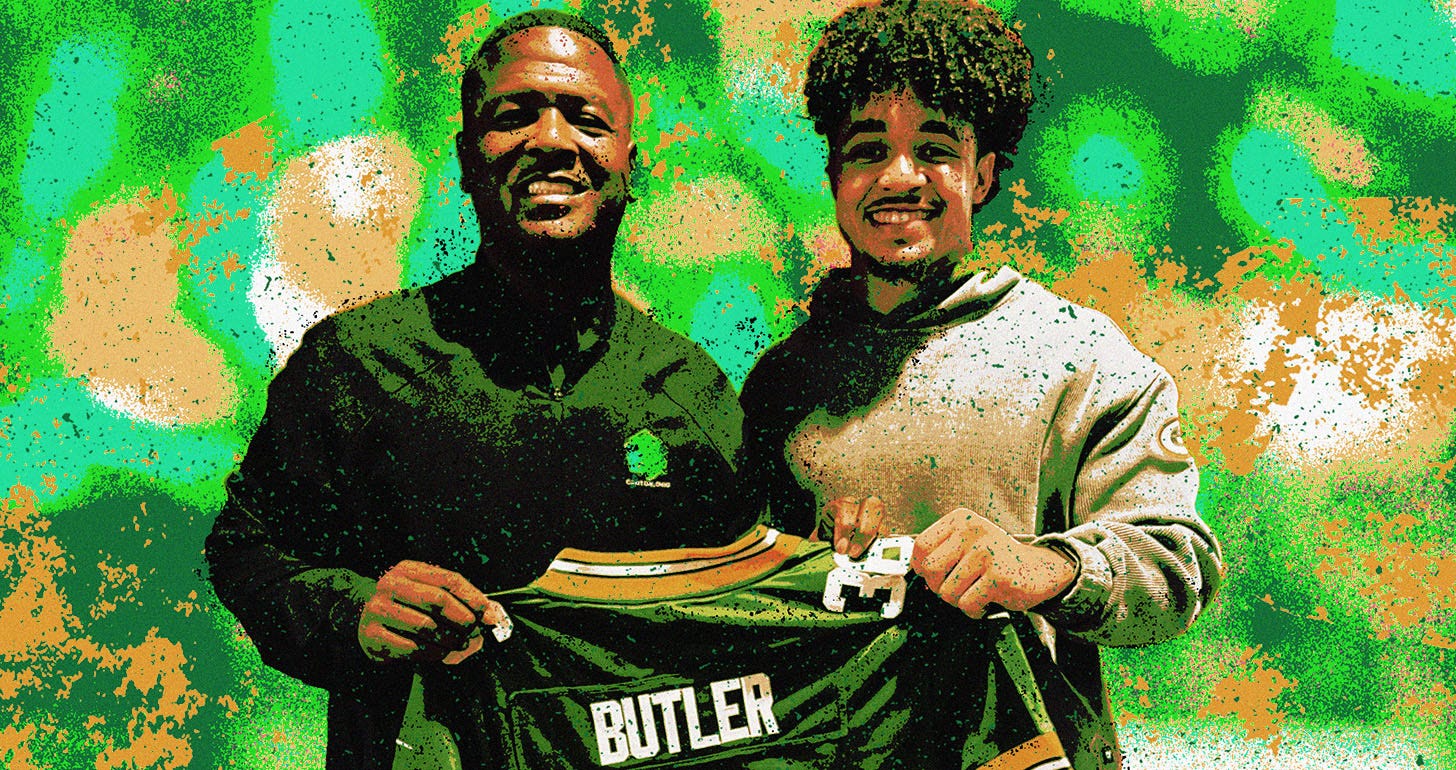
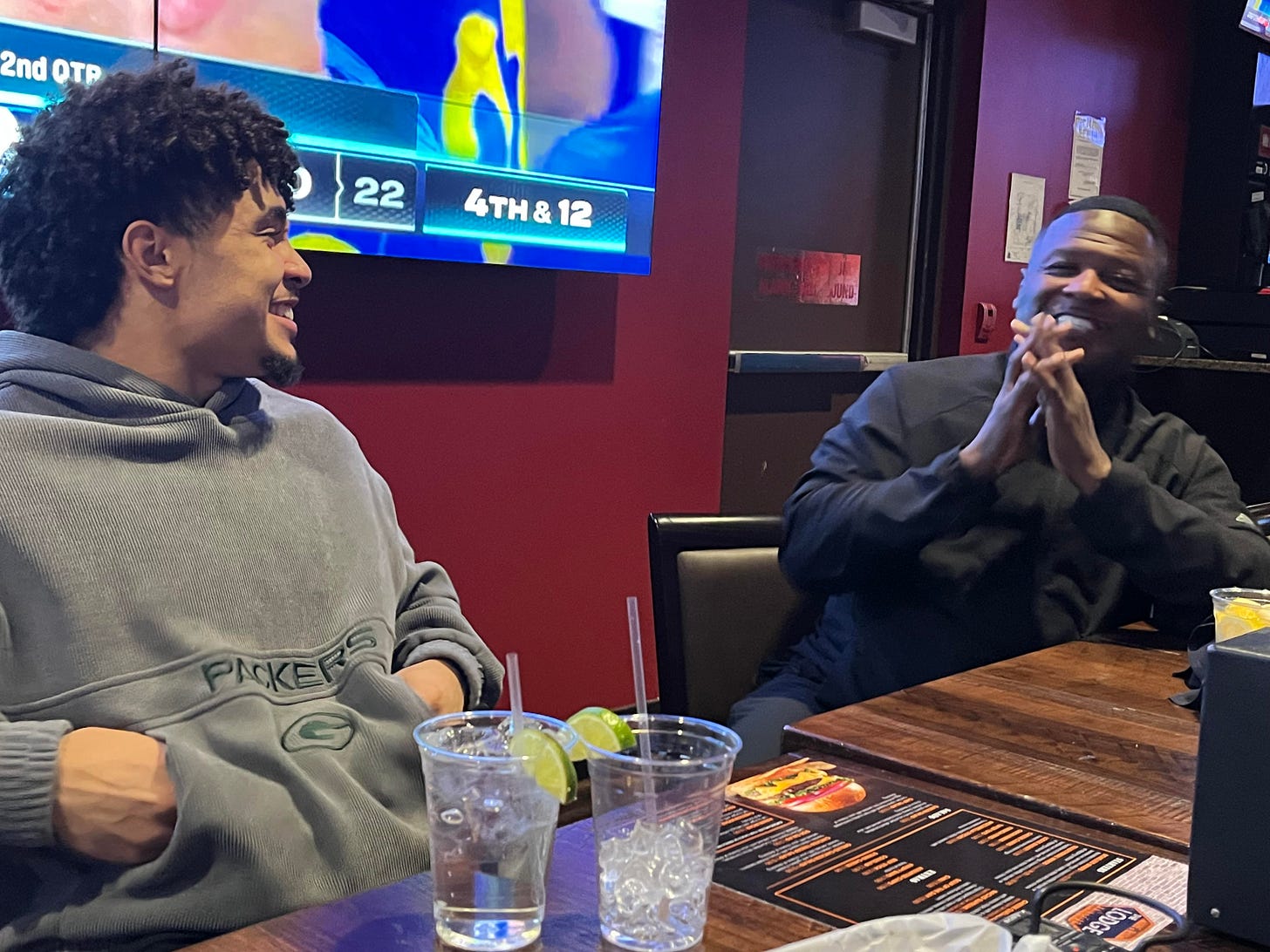

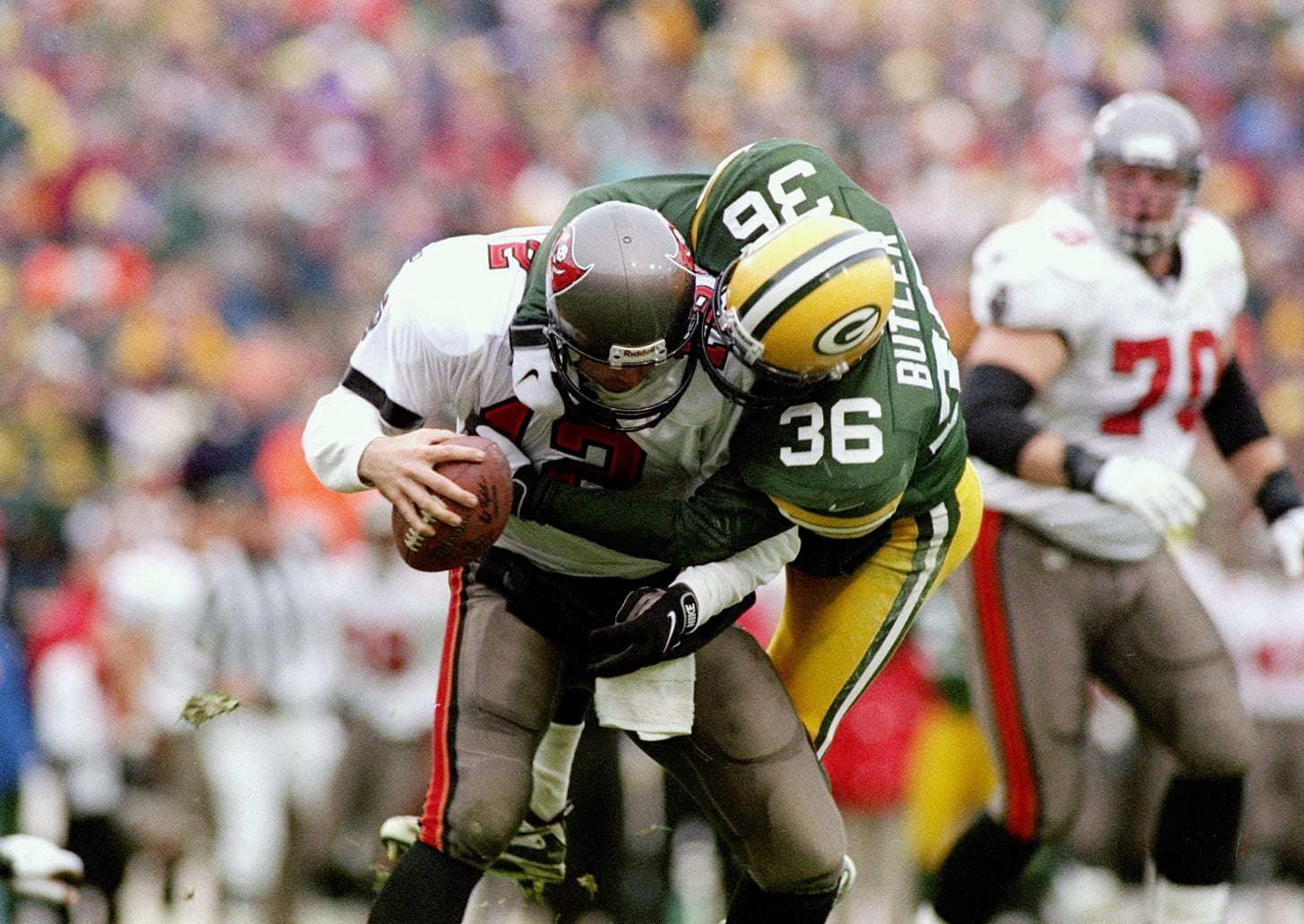
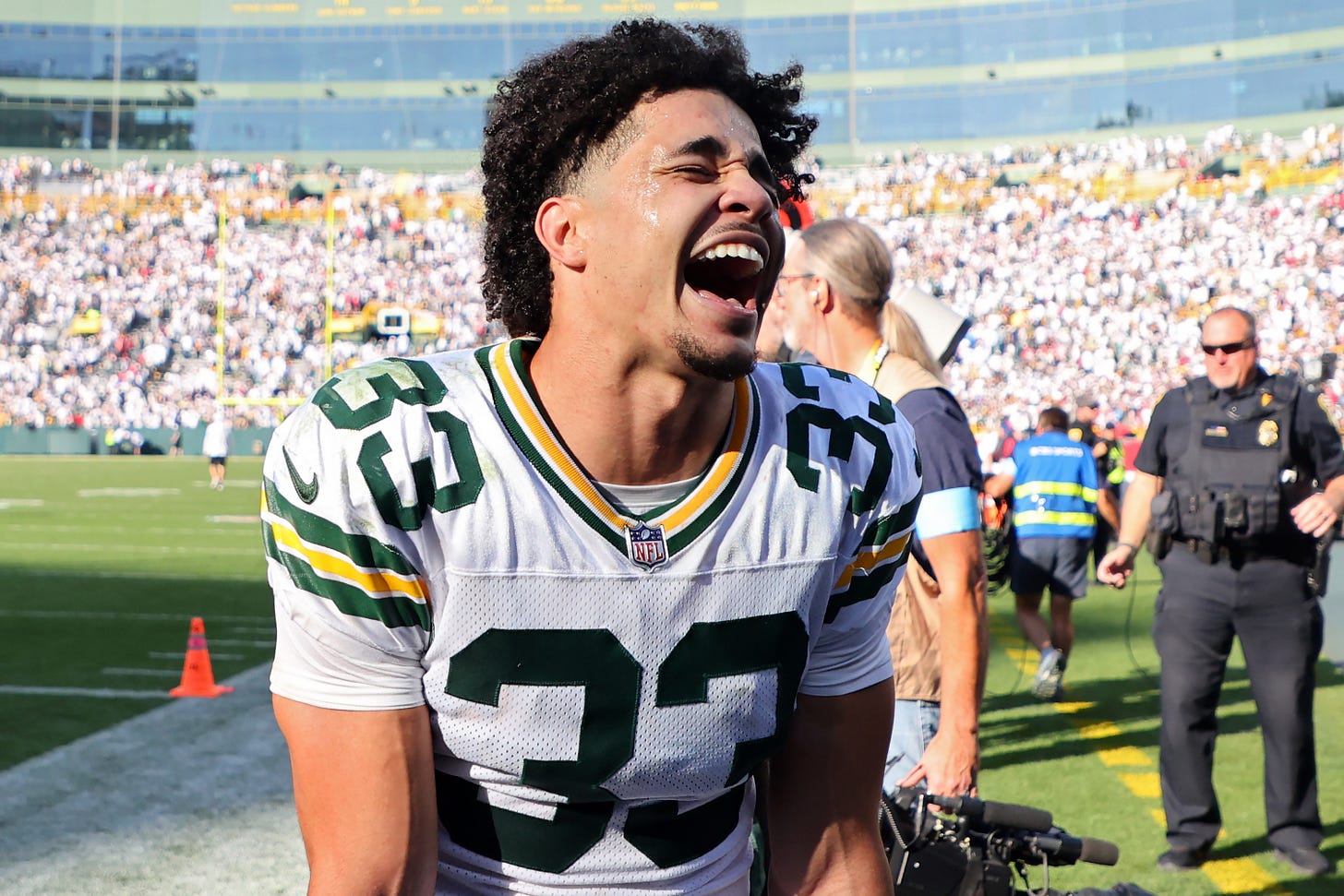

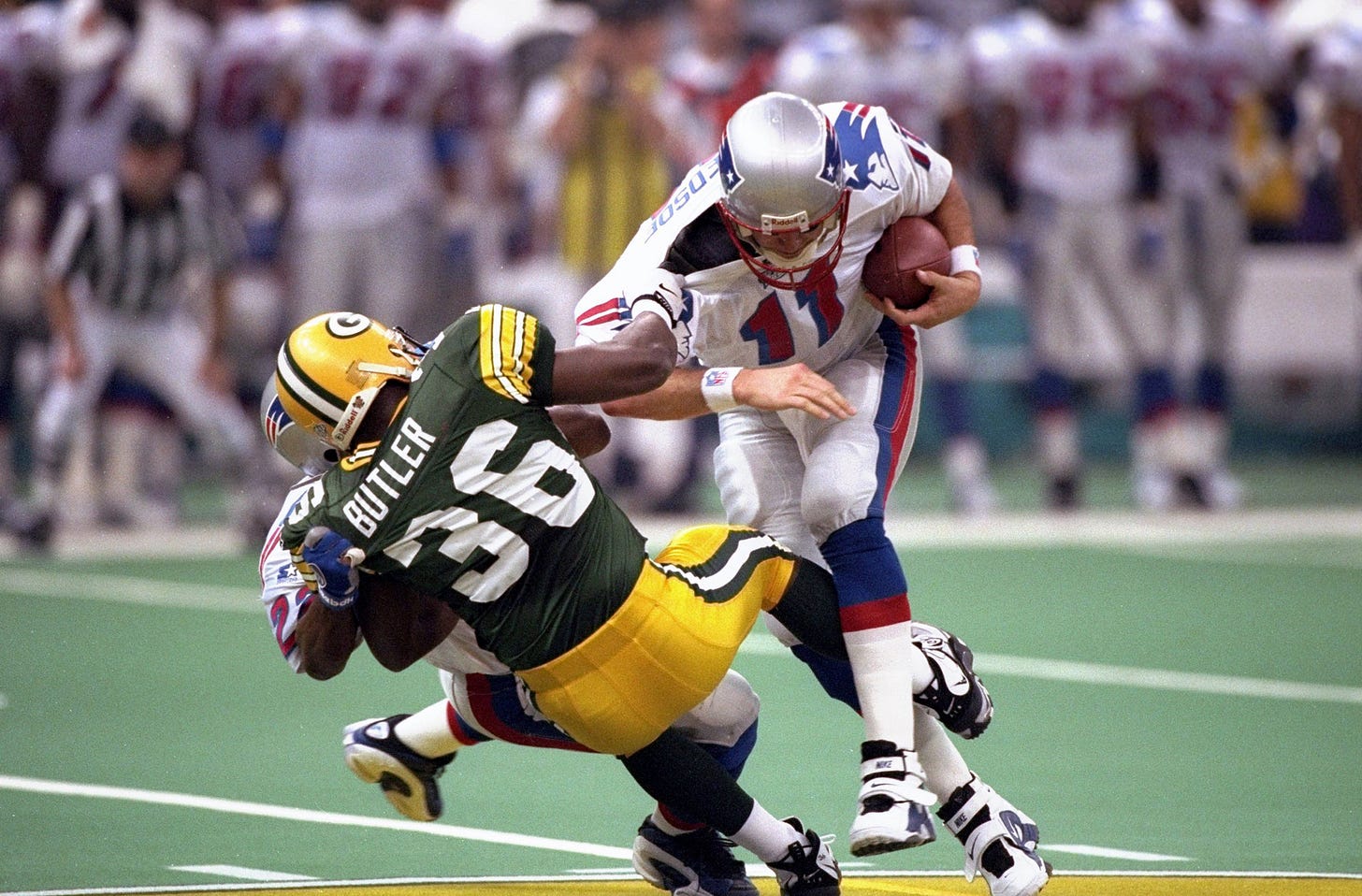
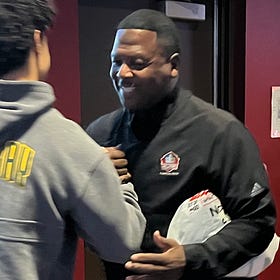
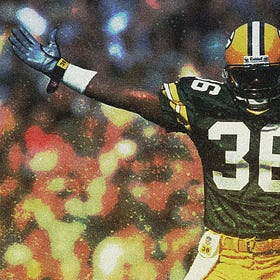













Great story! Leroy always delivers. Great to hear more about Williams and his backstory.
fantastic article!
from one legend to hopefully a future one.